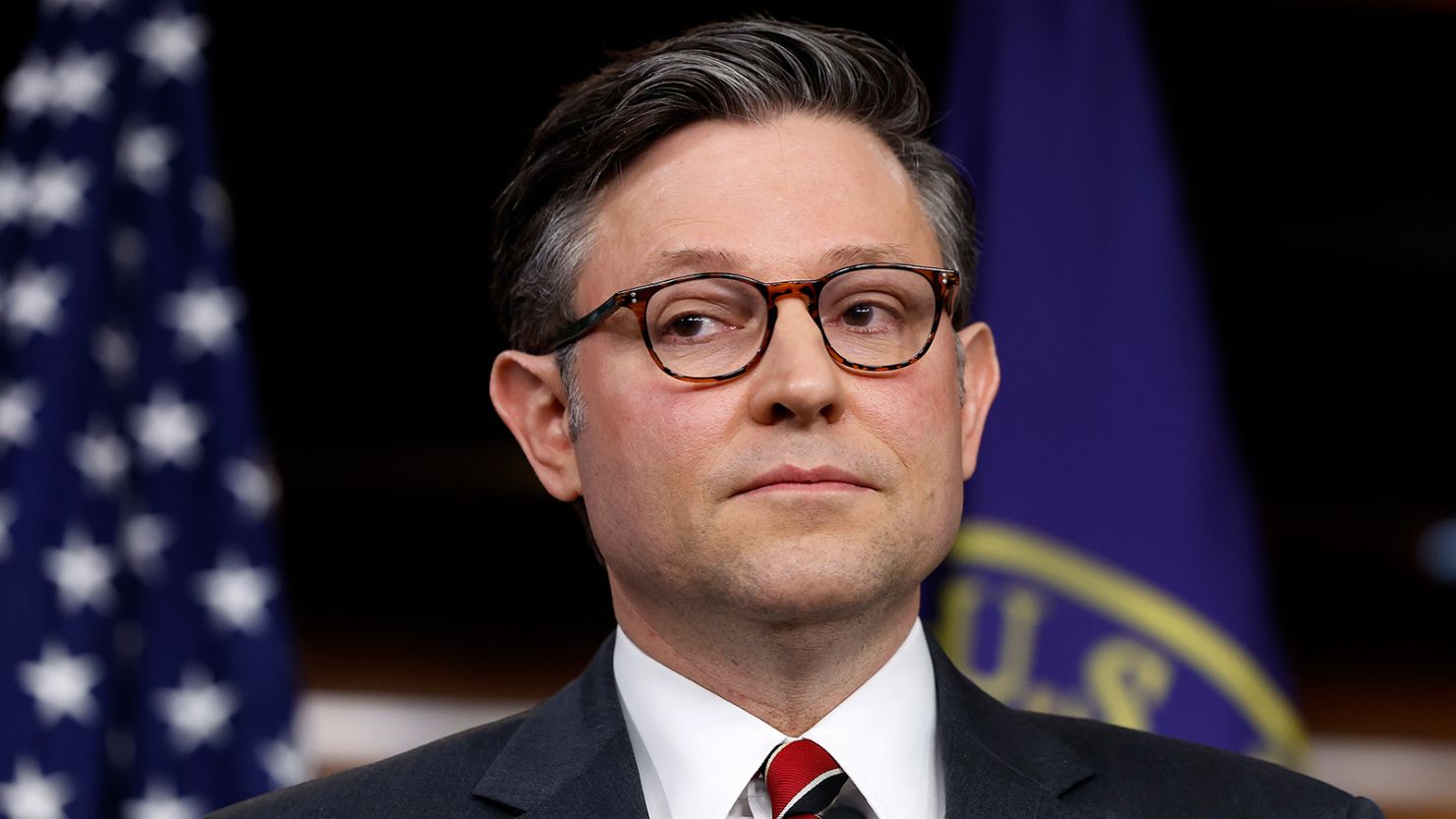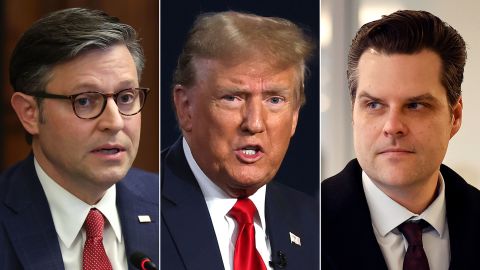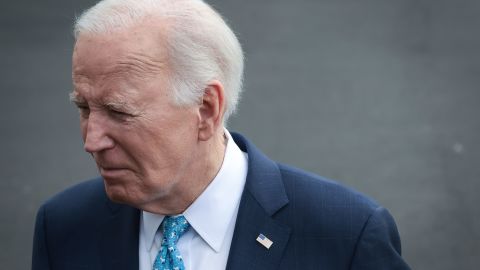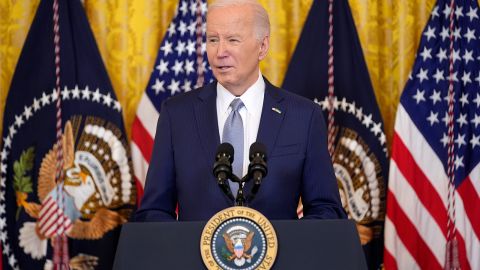begin quote from:
https://www.cnn.com/2024/02/27/politics/mike-johnson-urkaine-aid-dilemma/index.html
House Speaker Mike Johnson faces a defining dilemma on Ukraine

House Speaker Mike Johnson has the fate of a democracy and a people in his hands.
It’s not the United States, which will survive – even if the coming general election results in another existential test for the constitutional system.
The country Johnson has the power to save is Ukraine, two years after Russian President Vladimir Putin invaded, decreeing that it didn’t have the right to exist.
Ukraine’s soldiers – trapped in a World War I-style hellscape of trench warfare – are running out of bullets. There are signs that Russia may be about to break a stalemate and tip the war its way.
Johnson, a backbencher who was the last-ditch choice to lead the mutinous House GOP majority last year, could relieve Ukraine’s agony and help ensure its survival as an independent nation in the coming days. He could allow a vote on a bill that includes $60 billion in aid that the Pentagon says is needed to allow Kyiv to continue to effectively fight. It would likely pass with a comfortable bipartisan majority.
The Louisiana Republican’s reluctance to do so is a commentary on the growing power of GOP front-runner Donald Trump, the sharp turn of his party away from its globalist pro-democracy heritage and perhaps even his own ambition since borrowing Democratic votes to finance Ukraine’s defense could cost him the speakership.
The speaker is coming under extreme pressure on multiple fronts, at home and abroad, as coinciding crises that he’s postponed over his young speakership come to the boil at once. Most immediately, without a budget deal with the Democratic Senate, the government could hurtle into a partial shutdown by the weekend.
His predicament was highlighted at a meeting of the top four congressional leaders at the White House on Tuesday called by President Joe Biden.
Senate Majority Leader Chuck Schumer said after the talks that he told Johnson that this was one of the handful of times that “history is looking over your shoulder” and that he would regret not acting. The New York Democrat added that it was the consensus in the room that Ukraine would lose the war if President Volodymyr Zelensky did not quickly get more weapons.
“The overwhelming sentiment is that we have got to do Ukraine now,” Schumer told reporters outside the West Wing, describing the talks as one of the most intense sessions he has ever encountered in the Oval Office.
After the speaker emerged from the meeting and a one-on-one conversation with Biden, he indicated that despite the fervent lobbying of the other leaders, his position had not changed. He said he told the group and the president that House Republicans wanted to see action to address the southern border crisis before acting on Ukraine. “We must take care of America’s needs first,” Johnson said. House Republicans, prompted by Trump, the GOP front-runner, have already rejected a bipartisan Senate deal tightening border security and asylum policies that would have been one of the most conservative such measures in years.
Johnson, of Louisiana, is besieged by intensifying calls among Republicans opposed to more Ukraine aid, especially from the pro-Trump wing of his conference, as he seeks to cling to his job longer than his ill-fated predecessor Kevin McCarthy. But Johnson’s lonely dilemma is being sharpened as the administration singles him out as the one man who can thwart or enable Putin’s attempt to wipe Ukraine off the map. Zelensky starkly warned in an interview with CNN’s Kaitlan Collins that his country could not succeed in repelling Russia without the aid. Foreign governments that fear the Western coalition against Moscow could crumble without US cash and influence have been calling on the speaker to act. And the pressure of Zelensky’s forces facing battlefield defeats threatens to hand Republicans the blame if desperately needed arms are not soon rushed to the front.
It is a daunting picture for a speaker who rose from obscurity only months ago, and who lacks the experience, vote-counting nous and leverage needed to cajole a Republican majority into shape.
So far, Johnson has offered little evidence that he has the political dexterity to navigate himself out of his dicey spot. But even a master of parliamentary muscle flexing might struggle with such a weak hand. His minute majority means he can afford to lose only a handful of votes among GOP members to pass a bill – a reality that gives extremist members outsize influence. The fate of McCarthy, ousted last year by his own side, casts daily doubt on Johnson’s ability to survive. The threat comes the speaker’s own far-right flank of a party that is increasingly nationalist, populist and isolationist after being transformed by Trump. A $60 billion aid package to a foreign democracy is incompatible with the “Make America Great Again” creed of the ex-president’s movement — and is largely opposed by GOP voters at the grassroots.
So even if Johnson wants to rescue Ukraine, it may be politically impossible to do so. Nothing can be guaranteed in a fractious Congress, with a House GOP majority that has rendered the United States close to ungovernable and is threatening America’s global leadership role.
A tense White House meeting in prospect
Johnson found himself outnumbered Tuesday. Joining him on the Oval Office sofas were House Minority Leader Hakeem Jeffries, Senate Republican leader Mitch McConnell and Schumer — all of whom support the swift and significant dispatch of funds for Ukraine.
“There is a strong bipartisan majority in the House standing ready to pass this bill if it comes to the floor,” Biden national security adviser Jake Sullivan said on CNN’s “State of the Union” on Sunday. “And that decision rests on the shoulders of one person. And history is watching whether Speaker Johnson will put that bill on the floor. If he does, it will pass, we will get Ukraine what it needs for Ukraine to succeed.” Sullivan added: “If he doesn’t, then we will not be able to give Ukraine the tools required for it to stand up to Russia, and Putin will be the major beneficiary of that.”
But the pressure Johnson confronts at the White House will pale in comparison to the fury he will invoke on Capitol Hill if he caves to Biden. For some Republicans, passing a new aid package to Ukraine would constitute another grave failure for a House majority that has repeatedly infuriated its most right-wing lawmakers by falling short of enacting extreme spending cuts, despite the reality that Washington political power is two-thirds controlled by Democrats.
Ukraine’s fate is also hostage to the rising political fortunes of Trump. The former president still fumes over his first impeachment, which revolved around a bid to coerce the Zelensky government, and seems to favor Putin over democracy in the conflict. He’s warned that no more US aid should be sent as he anchors his campaign on the southern border crisis, although he has not ruled out aid to Ukraine entirely. He said in a social media post on February 10, for instance, that a loan might be possible — even though Ukraine, with its wrecked economy, would be in no state to repay any time soon. Trump’s plan sounded more like a for-profit scheme than a defense of a nation under attack. “We should never give money anymore without the hope of a payback or without ‘strings’ attached. The United States of America should be ‘stupid’ no longer!” Trump wrote on Truth Social.
House GOP leaders are sticking to the line that there can be no aid for Ukraine without a vigorous new effort to secure America’s border following a record of number of migrant encounters late last year. There’s no doubt there is a border crisis. But Trump and House Republicans combined to kill off a bipartisan Senate compromise that would have produced the most conservative enforcement reforms in years – apparently because the ex-president wanted to deprive Biden of an election-year victory.
But the GOP message is a unifying force in the party. “So many citizens are saying, ‘Why are we sending billions of dollars to protect Ukraine while our country remains open?’” Rep. Byron Donalds of Florida, a Trump ally, said on NBC’s “Meet the Press” on Sunday.
Heat from overseas
Johnson is coming under massive heat from Zelensky, who is increasingly desperate given increasing doubts about his capacity to resist Putin’s forces over the long term. The Ukrainian president noted in the CNN interview that the speaker had previously assured him of support. “What can I do? I can’t push the speaker. This is his decision. But I think he understands all the challenges, what we have,” Zelensky said.
“I have to trust. But we will see.”
Johnson is also facing intense lobbying from leading voices of the Western alliance. In the United States in December, British Foreign Secretary David Cameron met the speaker and told CNN that Washington was a lynchpin for the entire war effort and that the money would make a “huge difference.” He has continued his advocacy for the package ever since, earning the ire of one of Trump’s top backers in the House, Rep. Marjorie Taylor Greene of Georgia, who said that the British Lord could “kiss my a**.”
Other friends of the United States are warning Johnson of a catastrophic blow to US prestige and power abroad if the package isn’t passed. Polish Foreign Minister Radoslaw Sikorski implored Johnson to consider the consequences of further delaying Ukraine’s US lifeline. “I would say, Mr. Speaker, it is the fate of Ukraine, it is the tortured people of Ukraine that beg you, but it is also the credibility of your country that is at stake,” Sikorski told CNN’s “Fareed Zakaria GPS” on Sunday. The minister noted that Biden traveled to Kyiv last year and put US credibility on the line, adding, “The word of the United States has been spoken. It needs to be followed up with action.”
Democratic Rep. Seth Moulton of Massachusetts told CNN on Monday, after returning from a trip to Asia, that US allies were watching Johnson’s moves closely because what he does next will influence other US adversaries.
“It was amazing. The officials in both Taiwan and Japan were supremely focused on whether or not we would deliver aid to Ukraine because of the message that that sends to Xi Jinping in China, someone, a dictator, who has said that he wants to invade Taiwan,” Moulton said on “CNN News Central.”
If persuasion doesn’t sway Johnson, the pressure of events might. Already, Ukrainian and US officials are warning that a paucity of ammunition is causing losses of territory and increasing casualties. If the outgunned Ukrainians suffer a string of battlefield defeats – and Putin’s forces advance – the speaker and his Republican majority could be blamed for a crisis that could threaten NATO and increase the chances of the hostilities involving American troops.
“If the US doesn’t provide military assistance, soon, we are going to start to see the Russians make significant gains,” American Enterprise Institute scholar Frederick Kagan said Monday. “If we don’t provide any more assistance at all, it’s very possible that you will end up seeing the front line start to move very rapidly toward the west by the end of this year.”
Johnson’s conundrum is rooted in treacherous domestic politics but has profound international implications. And there’s no sign he knows how to solve it.








No comments:
Post a Comment